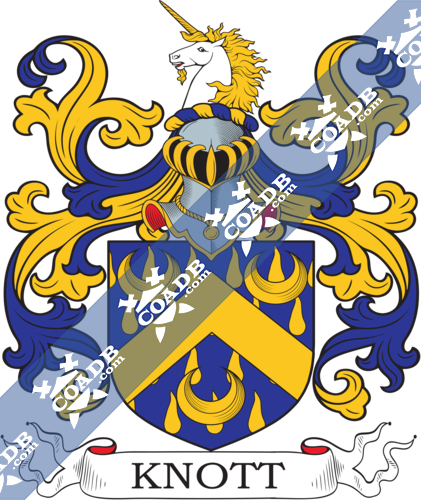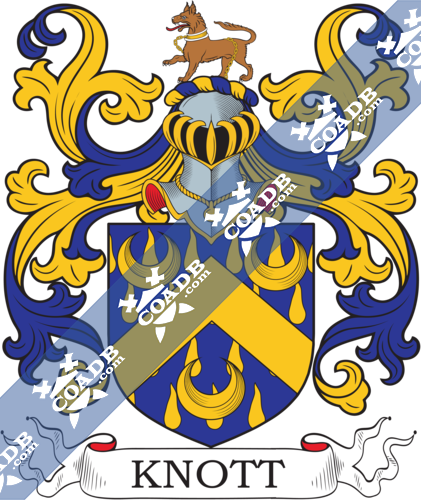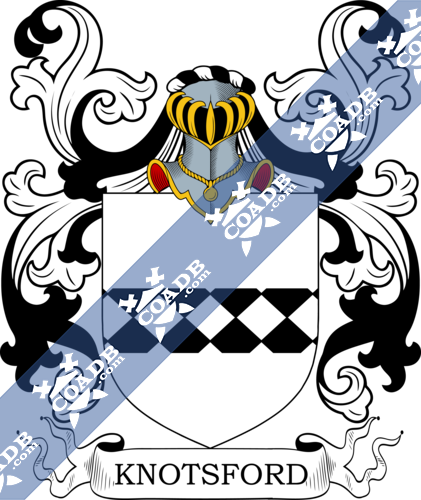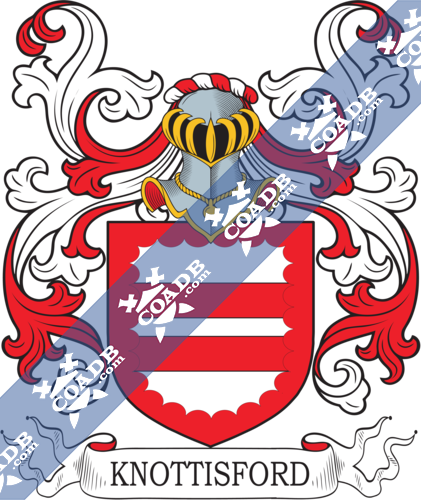Knott Family Crest, Coat of Arms and Name History
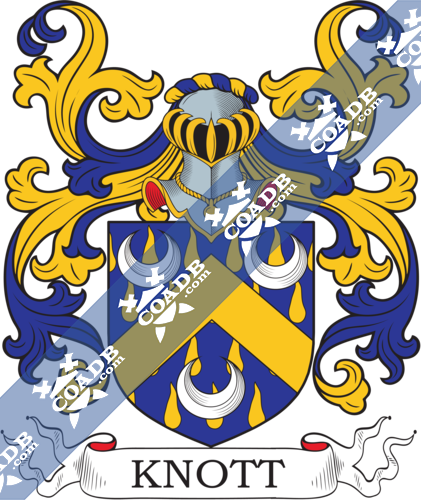
Knott Coat of Arms Gallery
Don’t know which Coat of Arms is yours?
We can do a genealogical research. Find out the exact history of your family!
Learn MoreKnott is an English surname of Germanic/Scandinavian origins which comes from one of three different sources. The first, and most likely source, comes from the Danish King Cnut, also known as Canute, who was King of England from 1016 until 1035; therefore, indicating the surname from this source survived the Norman invasion. The second source is topographical in origin deriving from the medieval English word “knot” which translates to mean a small hill. In this context, the name would have been used in reference to someone who lived on or near a hillock. The third source comes from the medieval English word “cnotta” which translates to knot fastening or knitting and would have been used as a nickname for a knitter, spinner, or weaver.
From the information above, it is easy to see that surnames were formed from a variety of sources., They put to use patriarchal or matriarchal names, reference to the individual’s occupation, some names derived from things such as defining physical traits, or familiar geographical location or a topographical landmark found near the individuals home or birthplace, the name of the village in which the person lived.
It should also be noted, while the surname Knott predates the Norman invasion, it is unique in nature as the use of surnames did not come into vogue in England until after the Norman invasion. Most residents in the small settlements and villages which existed during earlier eras across most of the British Isles, found little need for surnames as everyone within these communities knew each other and a given name would usually suffice. However, as communities grew and people began to migrate on a larger scale, the Norman aristocracy’s penchant for using surnames seemed to serve at least two practical purposes; it allowed for the distinguish of individuals who shared common given names, and it gave governments a reliable way to track people for immigration, tax and census purposes.
One of the earliest recordings of the surname, Walter Cnot, appears in the tax rolls of Suffolk dated 1165. These tax rolls hold the distinction of being the oldest consecutive set of records detailing English governance in the United Kingdom, with the oldest dating back to the 12th century. In medieval times, literacy was an attribute found primarily among the noble class, the clergy, and government officials, this meant most records were kept either by churches, priories, or government offices. Even so, often times there exists multiple variations in spelling of many surnames, offices. Even so, often times there exists multiple variations in spelling of many surnames, this is due to the fact, rules and guidelines for spelling were lax this resulted in, even those who were literate spelled many words phonetically. Unfortunately, what may have sounded one way to one person may have sounded different to another, resulting in a variety of spellings of this surname name; examples include but are not limited to; Knott; Knothe; Nott; Knaute; Knutsen; and Knutsson.
With the discovery of America and the addition of other countries to the British Commonwealth such as Canada, Australia and New Zealand, the use of surnames helped with the tracking of immigrants as well. One of the first recorded immigrants to America bearing the surname was James Knott who arrived and settled in Virginia in 1617. Issac Knott was one of the early settlers to Canada, arriving in 1860 and settling in Newfoundland. John Knott was one of the early settlers to Australia, arriving in 1838 and settling in Glenelg Roads. John and Annie Knott and their children Walter and Harry were early settler to New Zealand, arriving and settling in Auckland in 1883.
Worldwide, the highest concentration of people with the surname Knott are found in the United Kingdom, Australia, Canada, the United States, and New Zealand. State by state, the largest percentile of those with the surname Knott is in Kentucky and North Carolina.
There are many persons of note who bear the surname Knott. Sir John Frederick Knott is a noted British research scientist who was elected a Fellow of the Royal Society in 1990 and a Fellow of the Royal Academy of Engineering in 1988. He was also awarded Most Excellent Order of the British Empire.
Blazons & Genealogy Notes
1) (co. Suffolk). Az. guttee d’or a chev. of the last betw. three crescents ar.
2) (co. Sussex). Az. guttée d’or a chev. betw. three crescents of the last. Crest—A unicorn’s head ar. armed and crined or.
3) Same Arms. Crest—A wolf collared and chained ppr.

